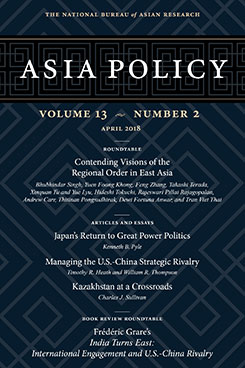Article in Asia Policy 13.2 (April 2018)
Avoiding U.S.-China Competition Is Futile
Why the Best Option Is to Manage Strategic Rivalry
This article argues that the structural drivers of U.S.-China competition are too deep to resolve through cooperative engagement and that policymakers must instead accept the reality of strategic rivalry and aim to manage it at a lower level of intensity.
EXECUTIVE SUMMARY
MAIN ARGUMENT
Rising tensions between China and the U.S. have spurred fears that the two countries could end up in conflict or recreate the Cold War. To avoid these outcomes, analysts have proposed ways to defuse competition and promote cooperation. However, because these arguments do not address the structural drivers underpinning U.S.-China competition, such proposals are unlikely to end the rivalry. Conflict is not inevitable, however, and aggressive strategies that unnecessarily aggravate the sources of rivalry are likely to prove dangerously counterproductive. The best option at this point is, paradoxically, for the U.S. to accept the reality of the growing strategic rivalry and manage it at a lower level of intensity.
POLICY IMPLICATIONS
- Maintaining a technological edge is critical for the U.S. to successfully manage the rivalry with China. Policies should be pursued to ensure that the U.S. continues to attract and nurture the best science and technology talent and retains its status as the global leader in technology.
- To compete with China’s narrative about leading regional integration, the U.S. should both put forth a compelling vision for the region that encompasses widely held economic, security, and political values and continue to bolster its diplomatic and military positions in Asia.
- To maintain the U.S.-China rivalry at a stable level, policymakers in both countries should prioritize measures that discourage the mobilization of popular sentiment against the other country and encourage cultural exchanges.
- U.S.-China competition will likely become increasingly entwined with rivalries between China and U.S. allies and partners such as Japan and India. U.S. policymakers will need to take into account the independent dynamics of those separate rivalries when managing relations with China.
About Asia Policy
Asia Policy is a peer-reviewed scholarly journal presenting policy-relevant academic research on the Asia-Pacific that draws clear and concise conclusions useful to today’s policymakers. Asia Policy is published quarterly in January, April, July, and October and accepts submissions on a rolling basis. Learn more


